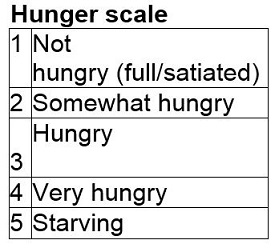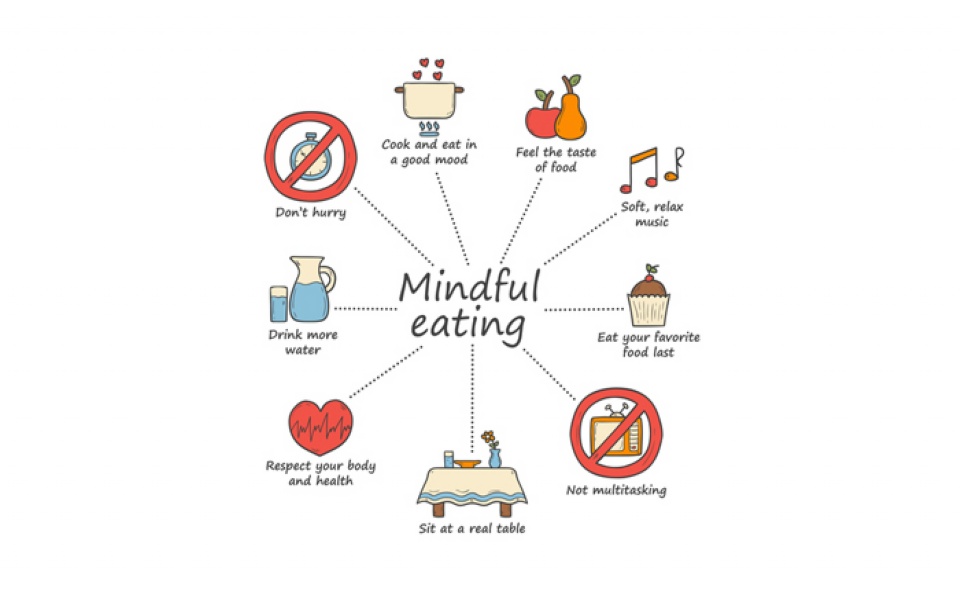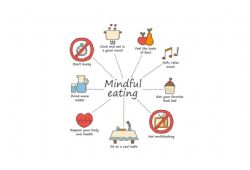Eating is natural and
necessary for survival. Although the main reason for eating is to
nourish our body, we also eat for pleasure. For many individuals, however,
the seemingly simple act of eating becomes complicated. Food restriction
for fear of weight gain causes many people to become
chronic dieters, which can often have the opposite effect.
Mindful eating vs. mindless
eating
Recent studies have shown
the key to sustained weight loss lies in developing
a positive relationship with food through mindful eating. What does
this mean? To understand mindful eating, it may help to provide some
examples of mindless (or distracted) eating. You’ve
likely done it yourself if you’ve ever finished a bag of chips while driving or
watching TV, snacked while catching up on emails, or simply
indulged in one too many holiday desserts at a party. When we eat
mindlessly we set ourselves up to overeat and often when we aren’t even
hungry. Mindful eating is about fully paying attention when having a meal
or snack. It involves using all your senses to explore, savour and taste your
food.
Be mindful of your hunger and
fullness cues
We don’t gain weight because we
eat what we love, we gain weight when we eat too much of what
we love! Check in with your stomach when you’re about to have a meal
or snack. Rate your hunger on a scale of one to five (see
scale below). Don’t wait until you’re starved;
do your “belly check” before meals and aim to eat when you’re
between a 3 or 4 on the hunger scale. During
meals, eat and chew slowly and pause between bites.
Remember it takes about twenty minutes for our bodies to recognize the feeling
of “fullness”. The best time to stop eating is when you are neither hungry nor
full. Take a little break at the half way point and check in with
your stomach again to see if you’re still hungry. Notice how the
taste of food actually changes when you start satisfying your hunger. It may
still taste good but the enjoyment you receive from each bite decreases until
finally eating is no longer pleasurable. In fact, eating past the level of
fullness becomes painful both physically and emotionally. The ability to find a
comfortable level of fullness is a skill we were all born with. With enough
practice, you can reclaim that skill; you just need to listen to your body
cues.
Slow down and be in the moment
If we are not “in the
moment” when we eat, where are we? Often with food, we are everywhere
else. We are thinking about the calories, about our busy day, watching
TV or even judging ourselves. Being in the moment and taking the
time to enjoy our food is extremely important, both for our mental and
physical well-being. Our fast-paced life prevents us from noticing the simple
things about a meal; color, texture, smell, or even the effort it took to
prepare it. When we eat mindfully, everything slows down. We
stop to notice how we are feeling. Are we tired, stressed out, overworked? The
more we connect with ourselves, the more likely we are to re-center ourselves
throughout the day. Running on auto pilot and rushing through
our day causes our body to be in constant “stress mode”.
According to some researchers,
stress hormone such as cortisol can promote weight gain. Not only
does cortisol secretion promote weight gain but it can also affect
where you put on the weight. Research shows that elevated cortisol
tends to cause weight gain in the abdominal area. Taking some
time aside to practice deep breathing a few times a day can be very beneficial.
When things get out of control and you feel your stress level rising, stop
whatever you are doing and notice how your entire body is feeling, take a few
deep abdominal breaths. Let each breath detoxify your body and calm your body.
Acknowledge your emotions and move towards a new direction. Act in a more
thoughtful and caring way towards yourself and work towards getting
your mind and body on the right track!
Connect with your emotions and
embrace the cravings!
We all experience cravings.
The best way to deal with them is by learning to
respond with a nonjudgmental observation. A craving usually
has a beginning, a peak and a moment when it subsides. If you constantly
avoid the foods you crave the most, you will most likely binge on
those foods at some point which will leave you feeling guilty and
defeated. Therefore, the best thing would be to have the food you are
craving but eat it mindfully. Take the time to fully enjoy that piece of
cake. Instead of telling yourself that “I shouldn’t be eating this
cake” tell yourself that “I choose to eat this cake”. Also, try to
tap into your feelings. Are you craving a certain food because you are
trying to numb or cover up your emotions? Some people find
comfort in food, especially fatty, salty and sweet foods. If that is the
case, consulting a psychologist and/or a nutritionist can be helpful.
We know that maintaining a
healthy weight is not easy as our weight is influenced by so many factors; some
related to the food choices we make and some related to external factors
that have nothing to with food, such as exercise, stress and sleep. There
is no such thing as a “perfect weight”. However, we know that individuals
who do eat mindlessly will inevitably pack on some extra pounds.
There is tremendous power in bringing our body and mind
together. Mindful eating is a skill that develops over time. Commit to
eating at least one meal or snack per day mindfully. You will have
many opportunities to experience savouring your food as you continue on your
journey to mindful eating. 

 In The Latest Issue:Latest Issue:
In The Latest Issue:Latest Issue:
- A Bittersweet Farewell
- The new Laval Aquatic Co...
- The End of an Era:
Articles
Calendar
Virtual- ANNUAL TEACHER APPRECIATION CONTEST
- APPUI LAVAL
- ARTS & CULTURE
- CAMPS
- CAR GUIDE
- CCIL
- CENTENNIAL ACADEMY
- CHARITY FUNDRAISING
- CITYTV
- COSMODÔME
- COMMUNITY CONNECTIONS
- COVER STORY
- DINA DIMITRATOS
- ÉCOLE SUPÉRIEURE DE BALLET DU QUÉBEC
- EDITORIALS
- ÉDUCALOI
- EDUCATION
- EMPLOYMENT & ENTREPRENEURSHIP
- FÊTE DE LA FAMILLE
- FÊTE DU QUARTIER SAINT-BRUNO
- FAMILIES
- FESTIVAL LAVAL LAUGHS
- FÊTE DE QUARTIER VAL-DES-BRISES
- FINANCES
- GLI CUMBARE
- GROUPE RENO-EXPERT
- HEALTH & WELL-BEING
- 30 MINUTE HIT
- ANXIETY
- CHILDREN`S HEALTH & WELLNESS
- CLOSE AID
- DENTAL WELLNESS
- EXTREME EVOLUTION SPORTS CENTRE
- FONDATION CITÉ DE LA SANTÉ
- GENERAL
- HEARING HEALTH
- MESSAGES FROM THE HEALTH AGENCY OF CANADA
- MENTAL HEALTH
- SEXUALITY
- SOCIAL INTEGRATION
- SPECIAL NEEDS
- TEENS
- THE NUTRITION CORNER
- THE NUTRITION CORNER - RECIPES
- VACATION DESTINATION
- WOMEN'S FITNESS
- WOMEN'S HEALTH
- HILTON MONTREAL/LAVAL
- HOME & GARDEN
- INTERNATIONAL WOMEN'S DAY
- JAGUAR LAVAL
- LAVAL À VÉLO
- LAVAL FAMILIES TV SHOW
- LAVAL FAMILIES MAGAZINE CARES
- LAVAL URBAN IN NATURE
- LE PARCOURS DES HÉROS
- LES PETITS GOURMETS DANS MA COUR
- LEON'S FURNITURE
- LEONARDO DA VINCI CENTRE
- LFM PREMIERES
- LIFE BALANCE
- M.P. PROFILE
- MISS EDGAR'S AND MISS CRAMP'S SCHOOL
- MISSING CHILDREN'S NETWORK
- NETFOLIE
- NORTH STAR ACADEMY LAVAL
- OUTFRONT MEDIA
- PASSION SOCCER
- PARC DE LA RIVIÈRE-DES-MILLE-ÎLES
- PÂTISSERIE ST-MARTIN
- PIZZERIA LÌOLÀ
- PLACE BELL
- PORTRAITS OF YOUR MNA'S
- ROCKET DE LAVAL
- SACRED HEART SCHOOL
- SCOTIA BANK
- SHERATON LAVAL HOTEL
- SOCIÉTÉ ALZHEIMER LAVAL
- STATION 55
- STL
- SUBARU DE LAVAL
- TECHNOLOGY
- TEDXLAVAL
- TODAY`S LAURENTIANS AND LANAUDIÈRE
- TODAY`S LAVAL
- WARNER MUSIC
- THIS ISSUE
- MOST RECENT
Magazine
Lose Weight and Feel Great by Eating Mindfully
Articles ~e 105,7 Rythme FM 4 chemins Annual Teacher Appreciation Contest Appui Laval Arts & Culture Ballet Eddy Toussaint Camps THIS ISSUE MORE...
CONTESTS Enter our contests
CONTESTS Enter our contests
CALENDAR
Events & Activities
COMMUNITY Posts Events
PUBLICATIONS Our Magazine Family Resource Directory
LFM BUSINESS NETWORK Learn more
COUPONS Click to save!
COMMUNITY Posts Events
PUBLICATIONS Our Magazine Family Resource Directory
LFM BUSINESS NETWORK Learn more
COUPONS Click to save!
SUBSCRIPTIONS
Subscribe to the magazine
Un-Subscribe
E-NEWSLETTER Subscribe to our E-newsletter Un-Subscribe
WRITE FOR US Guidelines & Submissions
POLLS Vote today!
E-NEWSLETTER Subscribe to our E-newsletter Un-Subscribe
WRITE FOR US Guidelines & Submissions
POLLS Vote today!
ADVERTISERS
How to & Media guide
Pay your LFM invoice
SUGGESTIONS Reader's Survey Suggest a Listing
LFM About Us Our Mission Giving Back Contact Us
SUGGESTIONS Reader's Survey Suggest a Listing
LFM About Us Our Mission Giving Back Contact Us
 PICK-UP LOCATIONS
Get a copy of LFM!
PICK-UP LOCATIONS
Get a copy of LFM!
TERMS & CONDITIONS Privacy | Terms
ISSN (ONLINE) 2291-1677
ISSN (PRINT) 2291-1677
Website by ZENxDESIGN




 BY:
BY: 
Tweet
Share